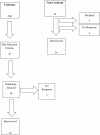Strategies for obtaining unpublished drug trial data: a qualitative interview study
- PMID: 23680054
- PMCID: PMC3685609
- DOI: 10.1186/2046-4053-2-31
Strategies for obtaining unpublished drug trial data: a qualitative interview study
Abstract
Background: Authors of systematic reviews have difficulty obtaining unpublished data for their reviews. This project aimed to provide an in-depth description of the experiences of authors in searching for and gaining access to unpublished data for their systematic reviews, and to give guidance on best practices for identifying, obtaining and using unpublished data.
Methods: This is a qualitative study analyzing in-depth interviews with authors of systematic reviews who have published Cochrane reviews or published systematic reviews outside of The Cochrane Library. We included participants who 1) were the first or senior author of a published systematic review of a drug intervention, 2) had expertise in conducting systematic reviews, searching for data, and assessing methodological biases, and 3) were able to participate in an interview in English. We used non-random sampling techniques to identify potential participants. Eighteen Cochrane authors were contacted and 16 agreed to be interviewed (89% response rate). Twenty-four non-Cochrane authors were contacted and 16 were interviewed (67% response rate).
Results: Respondents had different understandings of what was meant by unpublished data, including specific outcomes and methodological details. Contacting study authors was the most common method used to obtain unpublished data and the value of regulatory agencies as a data source was underappreciated. Using the data obtained was time consuming and labor intensive. Respondents described the collaboration with other colleagues and/or students required to organize, manage and use the data in their reviews, generally developing and using templates, spreadsheets and computer programs for data extraction and analysis. Respondents had a shared belief that data should be accessible but some had concerns about sharing their own data. Respondents believed that obtaining unpublished data for reviews has important public health implications. There was widespread support for government intervention to ensure open access to trial data.
Conclusions: Respondents uniformly agreed that the benefit of identifying unpublished data was worth the effort and was necessary to identify the true harms and benefits of drugs. Recent actions by government, such as increased availability of trial data from the European Medicines Agency, may make it easier to acquire critical drug trial data.
References
-
- Norris S, Holmer HK, Ogden LA, Fu R, Abou-Setta AM, Viswanathan MS, McPheeters ML. Selective Outcome Reporting as a Source of Bias in Reviews of Comparative Effectiveness. (Prepared by the Oregon Evidence-based Practice Center under Contract No. 290-2007-10057-I.) AHRQ Publication No. 12-EHC110-EF. AHRQ. Agency for Healthcare Research and Quality: Rockville, MD; 2012. - PubMed
-
- Scherer R, Langenberg P, von Elm E. Full publication of results initially presented in abstracts. Cochrane Database Syst Rev. 2007;2 MR000005. - PubMed
Publication types
MeSH terms
Substances
LinkOut - more resources
Full Text Sources
Other Literature Sources
Medical


